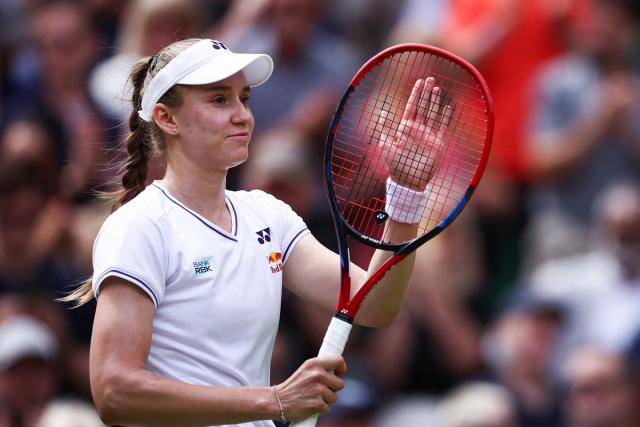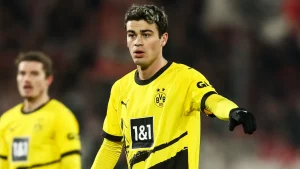
When you’ve already won Wimbledon, the idea of winning again might seem less daunting. “I don’t feel pressure,” said Elena Rybakina, the champion from two years ago. “Every opponent is difficult, and I know I must always bring my best. That’s what I try to do for every match. I’m just really enjoying every time I step out on the court. I am happy I am doing well in the draw and hopefully, I can go all the way to the end.”
Rybakina advanced to the quarter-finals on Monday when her opponent, Russia’s Anna Kalinskaya, retired due to a wrist injury while trailing 6-3, 3-0 on Centre Court. Rybakina was in dominant form before Kalinskaya’s withdrawal. Two years after her victory here, the Kazakh will face Elina Svitolina for a place in the semi-finals.

Since Aryna Sabalenka’s injury withdrawal on the eve of the event, the women’s singles draw has been more open than expected. The defeats of Iga Swiatek and Coco Gauff have left Elena Rybakina as the favorite for the title. However, she seems unfazed by the prospect of winning again. “I don’t really think about this when I go on the court,” she said. “Of course, it gives more confidence, but there are still a lot of good players. I don’t really think about it so much.
“It feels good, of course, if people think so. But it’s still far to go to the final with many matches ahead. As I always say, it’s just match by match, and we’ll see how it goes. But I definitely want to go far and try to win it.”
Rybakina has earned her favorite status. Seeded fourth, her victory over Kalinskaya, who was watched by her boyfriend, world No. 1 Jannik Sinner, means she has now won 18 of her first 20 matches at Wimbledon. This 90% win ratio is a feat only Steffi Graf and Ann Jones have achieved in the Open era. “I didn’t know about these stats,” said Rybakina, with a deadpan expression that didn’t reveal whether she knew of Jones, the 1969 champion. “I know I’ve been winning a lot on grass. It’s nice to be next to these names with these statistics. I think it’s great to be there and really happy to show good tennis on grass.”
Her bid for a second title in three years will be tested in the next round when she faces Elina Svitolina, the Ukrainian who continues to use her platform to highlight her country’s plight after Russia’s invasion in March 2022. On the day a Russian missile hit a children’s hospital in Kyiv, Svitolina, a semi-finalist last year, showed her resilience by focusing on her match and securing a 6-2, 6-1 victory over Xinyu Wang.

“It was extremely tough,” she said. “Since this morning, I felt foggy with my thoughts and emotions. Normally, you spend the day thinking about your match, your opponent, and your strategy. Today was different; it was very quiet with my team because everyone knew what was happening. We were calm and focused on the essentials: what I needed to do on the court.
“Maybe that’s why I played very loose and focused on my tasks. My thoughts were occupied with the sad events and images of children, but I also had to concentrate on the match. It worked well today because I think I played very well.”
Rybakina and Svitolina have faced each other four times, each winning twice. Rybakina won their latest encounter at Roland Garros and their only match on grass. The crowd will likely support Svitolina, and Rybakina knows it will be challenging.
“She’s a tough opponent, reads the game well, and defends effectively,” she said. “She uses slices here and there. It won’t be easy. But if I play aggressively and serve well, I have a good chance to win. I will focus on myself and see how it goes.”
Rybakina is not the only Grand Slam champion remaining. Jelena Ostapenko, a former French Open champion, defeated Swiatek’s conqueror Yulia Putintseva 6-2, 6-3.
Barbora Krejcikova, seeded 31, knocked out No. 11 seed Danielle Collins 7-5, 6-3 to set up a quarter-final against Ostapenko. This defeat marks the end of Collins’s final Wimbledon, as she plans to retire at the end of the year to start a family.







